《大学英语》课程教学资源(教案讲义)新视野大学英语(4/4)

课程名称:新视野大学英语(4)1
1 课程名称:新视野大学英语 (4)
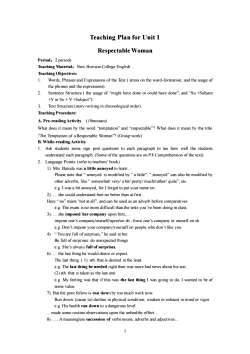
TeachingPlanforUnit1RespectableWomanPeriod:2periodsTeaching Material:New Horizon College EnglishTeaching Objectives:1.Words, Phrases and Expressions of theText(stress on theword-formation,and theusageofthe phrases and the expressions).2.Sentence Structure ( the usage of “might have done or could have done"; and “So +Subject+V or So + V+Subject").3.Text Structure (story-writing in chronological order)Teaching Procedure:A.Pre-readingActivity(1Ominutes)What does it mean by the word “temptation" and “respectable"? What does it mean by the title“The Temptation of a RespectableWoman"?(Group work)B. While-readingActivity1.Ask students some sign post questions to each paragraph to see how well the studentsunderstand each paragraph.(Someof the questions are on P.8 Comprehension of the text)2.LanguagePoints:(refertoteachersbook)1). Mrs. Baroda was a little annoyed to learn..Please note that “ annoyed: is modified by“ a little"“ annoyed" can also be modified byother adverbs, like“ somewhat/ very/ a bit/pretty/ much/rather/ quite", etc.e.g. I was a bit annoyed, for I forgot to put your name on .2)... she could understand him no better than at first.Here“"no"mans“"not at all",and can be used as an adverb beforecomparativese.g.The exam isnomoredifficultthan thetestsyou'vebeen doing inclass3)....sheimposedhercompanyuponhim,..imposeone'scompany/oneself/upon/on sb.;forceone'scompanyoroneselfonsbe.g. Don't impose your company/yourself on people who don't like you.4)“You are full of surprises,"he said to her.Be full of surprises: do unexpected thingse.g. She's always full of surprises.6)...the last thing he would desire or expect.The last thing: ( 1). sth. that is desired in the leaste.g.The last thing heneeded right then was more bad news about his son(2) sth. that is taken as the last onee.g. My feeling was that if this was the last thing I was going to do, I wanted to be ofsome value.7).Butthepoorfellowisrundownbytoomuch worknowRun down: (cause to) decline in physical condition; weaken or exhaust in mind or vigore.g. His health ran down to a dangerous level....made someroutineobservationsupon theunhealthyeffect..8)....Ameaningless succession of verbs nouns, adverbs and adjectives...2
2 Teaching Plan for Unit 1 Respectable Woman Period:2 periods Teaching Material:New Horizon College English Teaching Objectives: 1. Words, Phrases and Expressions of the Text ( stress on the word-formation, and the usage of the phrases and the expressions). 2. Sentence Structure ( the usage of “might have done or could have done”; and “So +Subject +V or So + V +Subject”). 3. Text Structure (story-writing in chronological order). Teaching Procedure: A. Pre-reading Activity (10minutes) What does it mean by the word “temptation” and “respectable”? What does it mean by the title “The Temptation of a Respectable Woman”? (Group work) B. While-reading Activity 1. Ask students some sign post questions to each paragraph to see how well the students understand each paragraph. (Some of the questions are on P.8 Comprehension of the text) 2. Language Points: (refer to teachers’ book) 1). Mrs. Baroda was a little annoyed to learn. Please note that “ annoyed: is modified by “ a little”. “ annoyed” can also be modified by other adverbs, like “ somewhat/ very/ a bit/ pretty/ much/rather/ quite”, etc. e.g. I was a bit annoyed, for I forgot to put your name on . 2). . she could understand him no better than at first. Here “ no” mans “not at all”, and can be used as an adverb before comparatives. e.g. The exam is no more difficult than the tests you’ve been doing in class. 3). . she imposed her company upon him,. impose one’s company/oneself/upon/on sb.; force one’s company or oneself on sb. e.g. Don’t impose your company/yourself on people who don’t like you. 4) “ You are full of surprises,” he said to her. Be full of surprises: do unexpected things e.g. She’s always full of surprises. 6). . the last thing he would desire or expect. The last thing: ( 1). sth. that is desired in the least e.g. The last thing he needed right then was more bad news about his son. (2) sth. that is taken as the last one e.g. My feeling was that if this was the last thing I was going to do, I wanted to be of some value. 7). But the poor fellow is run down by too much work now. Run down: (cause to) decline in physical condition; weaken or exhaust in mind or vigor e.g. His health ran down to a dangerous level. .made some routine observations upon the unhealthy effect. 8). . A meaningless succession of verbs nouns, adverbs and adjectives
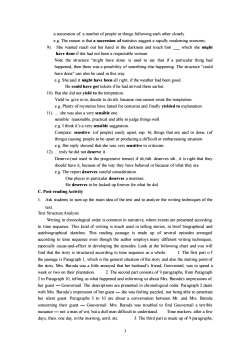
a succession of:anumber of people or things following each other closelye.g. The reason is that a succession of statistics suggest a rapidly weakening economy9).Shewanted reachoutherhandinthedarknessand touchhimwhichshemighthavedone if shehad notbeen arespectable woman.Note the structure “might have done: is used to say that if a particular thing hadhappened, then there was a possibility of something else happening. The structure“"couldhave done"can also be used in this waye.g. She said it might have been all right, if the weather had been goodHe could have got tickets if he had arrived there earlier10).But shedidnot yield to the temptationYield to: give in to; decide to do sth. because one cannot resist the temptation.e.g.Plenty ofmysteries have lasted for centuries and finally yielded to explanation11)... she was also a very sensible one.sensible: reasonable, practical and able to judge things welle.g. I think it's a very sensible suggestion.Compare: sensitive:(of people) easily upset, esp.by things that are said or done; (ofthings)causing peopletobe upset orproducinga difficult or embarrassing situatione.g.Her reply showed that she was very sensitive to criticism.12)....trulyhedidnotdeserveit.Deserve:(not used in the progressive tenses) if sb,/sth. deserves sth., it is right that theyshould haveit,because of thewaytheyhavebehaved orbecauseof what they aree.g.The report deserves careful considerationOne player in particular deserves a mention.He deserves to be locked up forever for what he did.C.Post-readingActivity1.Ask students to sum up themain idea of the text and to analyze the writing techniques of thetext.Text StructureAnalysisWriting in chronological order is common in narrative, where events are presented accordingto time sequence. This kind of writing is much used in telling stories, in brief biographical andautobiographical sketches. This reading passage is made up of several episodes arrangedaccording to time sequence even though the author employs manydifferent writingtechniquesespecially cause-and-effect in developing the episodes. Look at the following chart and you willfind that the story is structured according to time sequence as a whole.1. The first part o fthe passage is Paragraph 1, which is the general situation of the story and also the starting point ofthe story. Mrs. Baroda was a little annoyed that her husband's friend, Gouvernail, was to spend aweekortwoontheirplantation2.The second part consists of 9 paragraphs, from Paragraph2toParagraph10,tellingus whathappened and informing usabout Mrs.Baroda's impressions ofher guest—Gouvernail. The descriptions arepresented in chronological order.Paragraph2 dealswith Mrs.Baroda's impression of herguest-shewas feeling puzzled,not beingableto penetrateher silent guest.Paragraphs 3 to 10 are about a conversation between Mr. and Mrs.Barodaconcerning their guest Gouvernail. Mrs. Baroda was troubled to find Gouvernail a terriblenuisance--not a man ofwit, butadull man difficult to understand.Timemarkers:afterafew3. The third part is made up of 9 paragraphs,days, then, one day, in the morning, until, etc.3
3 a succession of: a number of people or things following each other closely e.g. The reason is that a succession of statistics suggest a rapidly weakening economy. 9). She wanted reach out her hand in the darkness and touch him _ which she might have done if she had not been a respectable woman. Note the structure “might have done: is used to say that if a particular thing had happened, then there was a possibility of something else happening. The structure “could have done” can also be used in this way. e.g. She said it might have been all right, if the weather had been good. He could have got tickets if he had arrived there earlier. 10). But she did not yield to the temptation. Yield to: give in to; decide to do sth. because one cannot resist the temptation. e.g. Plenty of mysteries have lasted for centuries and finally yielded to explanation. 11). . she was also a very sensible one. sensible: reasonable, practical and able to judge things well e.g. I think it’s a very sensible suggestion. Compare: sensitive: (of people) easily upset, esp. by things that are said or done; (of things) causing people to be upset or producing a difficult or embarrassing situation e.g. Her reply showed that she was very sensitive to criticism. 12). .truly he did not deserve it. Deserve:(not used in the progressive tenses) if sb,/sth. deserves sth., it is right that they should have it, because of the way they have behaved or because of what they are e.g. The report deserves careful consideration. One player in particular deserves a mention. He deserves to be locked up forever for what he did. C. Post-reading Activity 1. Ask students to sum up the main idea of the text and to analyze the writing techniques of the text. Text Structure Analysis Writing in chronological order is common in narrative, where events are presented according to time sequence. This kind of writing is much used in telling stories, in brief biographical and autobiographical sketches. This reading passage is made up of several episodes arranged according to time sequence even though the author employs many different writing techniques, especially cause-and-effect in developing the episodes. Look at the following chart and you will find that the story is structured according to time sequence as a whole. 1. The first part o f the passage is Paragraph 1, which is the general situation of the story and also the starting point of the story. Mrs. Baroda was a little annoyed that her husband’s friend, Gouvernail, was to spend a week or two on their plantation. 2. The second part consists of 9 paragraphs, from Paragraph 2 to Paragraph 10, telling us what happened and informing us about Mrs. Baroda's impressions of her guest — Gouvernail. The descriptions are presented in chronological order. Paragraph 2 deals with Mrs. Baroda’s impression of her guest — she was feeling puzzled, not being able to penetrate her silent guest. Paragraphs 3 to 10 are about a conversation between Mr. and Mrs. Baroda concerning their guest — Gouvernail. Mrs. Baroda was troubled to find Gouvernail a terrible nuisance — not a man of wit, but a dull man difficult to understand. Time markers: after a few days, then, one day, in the morning, until, etc. 3. The third part is made up of 9 paragraphs
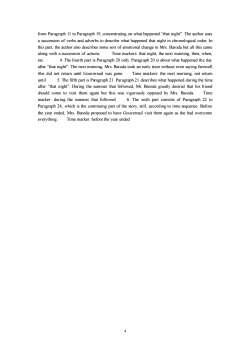
from Paragraph 11 to Paragraph 19,concentrating on what happened“that night"The author usesa succession of verbs and adverbs to describe what happened that night in chronological order. Inthis part, the author also describes some sort of emotional change in Mrs. Baroda but all this camealong with a succession of actions.Time markers: that night, the next morning, then, when,etc.4. The fourth part is Paragraph 20 only. Paragraph 20 is about what happened the dayafter “that night". The next morning, Mrs. Baroda took an early train without even saying farewell.She did not return until Gouvernail was gone.Time markers:the next morning,not returnuntil5. The fifth part is Paragraph 21. Paragraph 21 describes what happened during the timeafter “that night", During the summer that followed, Mr. Baroda greatly desired that his friendshould come to visit them again but this was vigorously opposed by Mrs. Baroda.Timemarker: during the summer that followed6. The sixth part consists of Paragraph 22 toParagraph 24, which is the continuing part of the story, still, according to time sequence, Beforethe year ended, Mrs. Baroda proposed to have Gouvernail visit them again as she had overcomeTime marker: before the year endedeverything.4
4 from Paragraph 11 to Paragraph 19, concentrating on what happened “that night”. The author uses a succession of verbs and adverbs to describe what happened that night in chronological order. In this part, the author also describes some sort of emotional change in Mrs. Baroda but all this came along with a succession of actions. Time markers: that night, the next morning, then, when, etc. 4. The fourth part is Paragraph 20 only. Paragraph 20 is about what happened the day after “that night”. The next morning, Mrs. Baroda took an early train without even saying farewell. She did not return until Gouvernail was gone. Time markers: the next morning, not return until 5. The fifth part is Paragraph 21. Paragraph 21 describes what happened during the time after “that night”. During the summer that followed, Mr. Baroda greatly desired that his friend should come to visit them again but this was vigorously opposed by Mrs. Baroda. Time marker: during the summer that followed 6. The sixth part consists of Paragraph 22 to Paragraph 24, which is the continuing part of the story, still, according to time sequence. Before the year ended, Mrs. Baroda proposed to have Gouvernail visit them again as she had overcome everything. Time marker: before the year ended
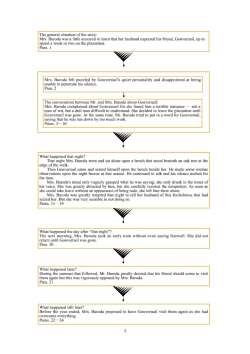
The general situation of the story:Mrs.Baroda was a little annoyed to learn thatherhusband expected hisfriend,Gouvermail,uptospendaweekortwoontheplantationPara,1Mrs.Baroda felt puzzled by Gouvernail's quiet personality and disappointed at beingunable to penetrate his silence.Para.2The conversation between Mr.and Mrs.Baroda about Gouvernail:Mrs.Baroda complained about Gouvermail for shefoundhim a terrible nuisancenotaman of wit,but a dull man difficult to understand.She decided to leave the plantation untilGouvernail was gone. At the same time,Mr.Baroda tried to put in a word for Gouvernail.saying thathewasrundownbytoomuchwork.Paras.3-10What happened that night?That night Mrs.Baroda went and sat alone upon a bench that stood beneath an oak tree at theedge of the walk.Then Gouvernail cameand seated himself upon the benchbesideher.Hemade some routineobservations upon thenight breeze at that scason.He continuedto talk andhis silence melted forthetimeMrs.Baroda's mind only vaguelygrasped what he was saying;she only drank in the tones ofhis voice. She was greatly attracted byhim, but she carefully resisted the temptation.As soon asshe could take leave without an appearance of being rude, she left him there alone.Mrs.Baroda was greatly tempted that night to tell her husband of this foolishness that hadseized her.But she was very sensible in notdoing so.Paras.11-19What happened the day after "that night"?The next morning, Mrs.Baroda took an early train without even saying farewell.She did notreturn until Gouvernailwas gone.Para.20Whathappenedlater?During the summer that followed, Mr.Baroda greatly desired that his friend should come to visitthem again but this was vigorously opposed by Mrs.Baroda.Para.21What happened still later?Before the year ended, Mrs.Baroda proposed to have Gouvernail visit them again as she hadovercome everything.Paras.22245
5
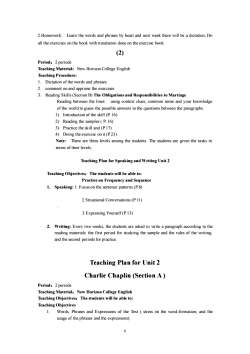
2.Homework:Learn the words and phrases by heart and next week there will be a dictation, Doall the exercises on the book with translation done on the exercise book.(2)Period:2periodsTeaching Material:New Horizon College EnglishTeaching Procedure:1.Dictation ofthewords and phrases2.comment on and appraise the exercises.3.ReadingSkills(SectionB)TheObligationsandResponsibilitiestoMarriageReadingbetweenthelines:usingcontextclues,common senseandyourknowledgeofthe world to guess the possible answers to the questions between the paragraphs.1)Introductionof theskill (P.16)2)Reading the samples (P.16)3)Practice the skill and (P.17)4)Doing the exercise on it(P.23)Note:There are three levels among the students. The students are given the tasks interms of their levels.Teaching Plan for Speaking and Writing Unit 2Teaching Objectives:The students will be able to:Practice on Frequency and Sequence1.Speaking: 1. Focus on the sentence patterns (P.8)2.Situational Conversations (P.11)3.Expressing Yourself (P.13)2.Writing: Every two weeks, the students are asked to write a paragraph according to thereading materials: the first period for studying the sample and the rules of the writing,andthesecondperiodsforpracticeTeachingPlanfor Unit2Charlie Chaplin (Section A)Period:2periodsTeaching Material:New Horizon College EnglishTeachingObjectives:Thestudents will beableto:Teaching Objectives1.Words, Phrasesand Expressionsof the Text(stress on the word-formation, and theusage of the phrases and the expressions)6
6 2.Homework: Learn the words and phrases by heart and next week there will be a dictation; Do all the exercises on the book with translation done on the exercise book. (2) Period:2 periods Teaching Material:New Horizon College English Teaching Procedure: 1. Dictation of the words and phrases 2. comment on and appraise the exercises. 3. Reading Skills (Section B) The Obligations and Responsibilities to Marriage Reading between the lines: using context clues, common sense and your knowledge of the world to guess the possible answers to the questions between the paragraphs. 1) Introduction of the skill (P. 16) 2) Reading the samples ( P. 16) 3) Practice the skill and (P.17) 4) Doing the exercise on it (P.23) Note: There are three levels among the students. The students are given the tasks in terms of their levels. Teaching Plan for Speaking and Writing Unit 2 Teaching Objectives:The students will be able to: Practice on Frequency and Sequence 1. Speaking: 1. Focus on the sentence patterns (P.8) 2.Situational Conversations (P.11) . 3.Expressing Yourself (P.13) 2. Writing: Every two weeks, the students are asked to write a paragraph according to the reading materials: the first period for studying the sample and the rules of the writing, and the second periods for practice. Teaching Plan for Unit 2 Charlie Chaplin (Section A ) Period:2 periods Teaching Material:New Horizon College English Teaching Objectives:The students will be able to: Teaching Objectives 1. Words, Phrases and Expressions of the Text ( stress on the word-formation, and the usage of the phrases and the expressions)
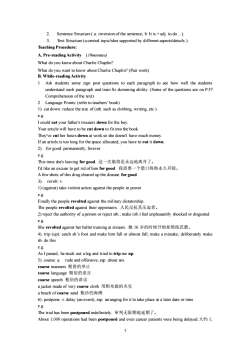
2.Sentence Structure(a: inversion of the sentence; b: It is +adj.to do...)3.Text Structure (a central topic/idea supported by different aspects/details ).Teaching Procedure:A.Pre-readingActivity(1OminutesWhat doyouknowabout Charlie Chaplin?What doyouwant toknowaboutCharlieChaplin?(Pairwork)B.While-readingActivity1Ask students some sign post questions to each paragraph to see how well the studentsunderstand eachparagraphandtrain Ss skimmingability.(Someof thequestions areonP.37Comprehension ofthetext)2 LanguagePoints:(refertoteachers'book)1).cut down: reduce the size of(sth.such as clothing,writing,etc.)e.g.I could cut yourfather's trousers downfor the boyYour article will have to be cutdown tofit into the bookThey've cut her hours down at work so she doesn't have much moneyIf an article is too long for the space allocated, you haveto cut it down2)..forgood:permanently,forevere.g.Thistimeshe's leavingforgood.这一次她将是永远地离开了。I'd likeanexcusetogetridofhimforgood.我需要一个借口将他永久开除。Afew shots ofthis drugcleared up the diseaseforgood3).revolt: v.1)(against)take violent action against thepeople inpowere.g.Finallythepeople revolted against themilitarydictatorshipThepeoplerevoltedagainsttheiroppressors.人民反抗其压迫者。2)reject the authorityof aperson or reject sth.,make(sb.)feelunpleasantly shocked or disgustede.g.Sherevoltedagainstherballettrainingatsixteen,她16岁的时候开始拒绝练芭蕾。4).trip (up): catch sb.'s foot and make him fall or almost fall; make a mistake; deliberately makesb. do thise.g.AsI passed, he stuck out a leg and tried to trip me up.5).coarse: a.rude and offensive, esp.about sexcoarsemanners粗鲁的举止coarselanguage粗俗的语言coarse speech粗俗的讲话ajacketmadeofverycoarsecloth用粗布做的夹克abeachofcoarsesand粗沙的海滩6).postpone: v. delay (an event), esp. arranging for it to take place at a later date or timee.g.Thetrialhas beenpostponed indefinitely。审判无限期地延期了。About 1,o00operationshad been postponed and even cancer patients were being delayed.大约1,7
7 2. Sentence Structure ( a: inversion of the sentence; b: It is + adj. to do.). 3. Text Structure (a central topic/idea supported by different aspects/details ). Teaching Procedure: A. Pre-reading Activity (10minutes) What do you know about Charlie Chaplin? What do you want to know about Charlie Chaplin? (Pair work) B. While-reading Activity 1 Ask students some sign post questions to each paragraph to see how well the students understand each paragraph and train Ss skimming ability. (Some of the questions are on P.37 Comprehension of the text) 2 Language Points: (refer to teachers’ book) 1). cut down: reduce the size of (sth. such as clothing, writing, etc.) e.g. I could cut your father's trousers down for the boy. Your article will have to be cut down to fit into the book. They've cut her hours down at work so she doesn't have much money. If an article is too long for the space allocated, you have to cut it down. 2). . for good: permanently; forever e.g. This time she's leaving for good. 这一次她将是永远地离开了。 I'd like an excuse to get rid of him for good. 我需要一个借口将他永久开除。 A few shots of this drug cleared up the disease for good. 3). revolt: v. 1) (against) take violent action against the people in power e.g. Finally the people revolted against the military dictatorship. The people revolted against their oppressors. 人民反抗其压迫者。 2) reject the authority of a person or reject sth.; make (sb.) feel unpleasantly shocked or disgusted e.g. She revolted against her ballet training at sixteen. 她 16 岁的时候开始拒绝练芭蕾。 4). trip (up): catch sb.'s foot and make him fall or almost fall; make a mistake; deliberately make sb. do this e.g. As I passed, he stuck out a leg and tried to trip me up. 5). coarse: a. rude and offensive, esp. about sex coarse manners 粗鲁的举止 coarse language 粗俗的语言 coarse speech 粗俗的讲话 a jacket made of very coarse cloth 用粗布做的夹克 a beach of coarse sand 粗沙的海滩 6). postpone: v. delay (an event), esp. arranging for it to take place at a later date or time e.g. The trial has been postponed indefinitely. 审判无限期地延期了。 About 1,000 operations had been postponed and even cancer patients were being delayed.大约 1
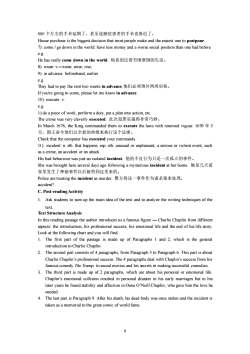
000个左右的手术延期了,甚至连癌症患者的手术也推迟了。House purchase is the biggest decision that most people make and the easiest one to postpone7).come/godown intheworld:haveless moneyand a worse social positionthanonehad beforee.g.Hehasreallycomedownintheworld.他真的过着穷困滚倒的生活。8).rouse:v.—raise, arise, rise,9).in advance:beforehand, earliere.g.Theyhadtopaytherenttwoweeksinadvance.他们必须预付两周房租。If you're going to come, please let me know in advance.10).execute:v.e.g.1)do a piece of work,perform a duty,put a plan into action, etc.Thecrimewasverycleverlyexecuted.此次犯罪实施得非常巧妙。InMarch1676,theKingcommandedthemtoexecutethelawswithrenewedvigour.1676年3月,国王命令他们以全新的热情来执行这个法律。Checkthat the computerhas executed yourcommands11). incident: n sth. that happens, esp. sth. unusual or unpleasant, a serious or violent event, suchas a crime,an accident or an attackHisbad behaviourwas justan isolatedincident.他的不良行为只是一次孤立的事件。Shewasbroughthereseveraldaysagofollowingamysteriousincidentatherhome.她是几天前家里发生了神秘事件以后被带到这里来的。Police aretreatingtheincidentasmurder.警方将这一事件作为谋杀案来处理。accident?C.Post-readingActivity1.Ask students to sum upthe main idea of thetext and toanalyze the writing techniques of thetext.Text Structure AnalysisIn this reading passage the author introduces us a famous figure —Charlie Chaplin from differentaspects: the introduction, his professional success, his emotional life and the end of his life story.Look at the following chart and you will find:1.The first part of the passage is made up of Paragraphs 1 and 2, which is the generalintroductiontoCharlieChaplin.2.The second part consists of 4paragraphs,fromParagraph3toParagraph 6.This part is aboutCharlie Chaplin's professional success.The 4paragraphsdeal with Chaplin's successfrom hisfamous comedy The Tramp, to sound movies and his secrets in making successful comedies.3.The third part is made up of 2 paragraphs, which are about his personal or emotional life.Chaplin's emotional collision resulted in personal disaster in his early marriages but in hislateryears hefound stabilityand affection in Oona O'Neill Chaplin,whogavehimtheloveheneeded.4.Thelast part is Paragraph9.Afterhis death,hisdead bodywas once stolen and the incident istaken as a memorial to thegreatcomic of world fame8
8 000 个左右的手术延期了,甚至连癌症患者的手术也推迟了。 House purchase is the biggest decision that most people make and the easiest one to postpone. 7). come / go down in the world: have less money and a worse social position than one had before e.g. He has really come down in the world. 他真的过着穷困潦倒的生活。 8). rouse: v.—raise; arise; rise; 9). in advance: beforehand, earlier e.g. They had to pay the rent two weeks in advance.他们必须预付两周房租。 If you're going to come, please let me know in advance. 10). execute: v. e.g. 1) do a piece of work, perform a duty, put a plan into action, etc. The crime was very cleverly executed. 此次犯罪实施得非常巧妙。 In March 1676, the King commanded them to execute the laws with renewed vigour. 1676 年 3 月,国王命令他们以全新的热情来执行这个法律。 Check that the computer has executed your commands. 11). incident: n. sth. that happens, esp. sth. unusual or unpleasant; a serious or violent event, such as a crime, an accident or an attack His bad behaviour was just an isolated incident. 他的不良行为只是一次孤立的事件。 She was brought here several days ago following a mysterious incident at her home. 她是几天前 家里发生了神秘事件以后被带到这里来的。 Police are treating the incident as murder. 警方将这一事件作为谋杀案来处理。 accident? C. Post-reading Activity 1. Ask students to sum up the main idea of the text and to analyze the writing techniques of the text. Text Structure Analysis In this reading passage the author introduces us a famous figure — Charlie Chaplin from different aspects: the introduction, his professional success, his emotional life and the end of his life story. Look at the following chart and you will find: 1. The first part of the passage is made up of Paragraphs 1 and 2, which is the general introduction to Charlie Chaplin. 2. The second part consists of 4 paragraphs, from Paragraph 3 to Paragraph 6. This part is about Charlie Chaplin’s professional success. The 4 paragraphs deal with Chaplin’s success from his famous comedy The Tramp, to sound movies and his secrets in making successful comedies. 3. The third part is made up of 2 paragraphs, which are about his personal or emotional life. Chaplin’s emotional collision resulted in personal disaster in his early marriages but in his later years he found stability and affection in Oona O’Neill Chaplin, who gave him the love he needed. 4. The last part is Paragraph 9. After his death, his dead body was once stolen and the incident is taken as a memorial to the great comic of world fame
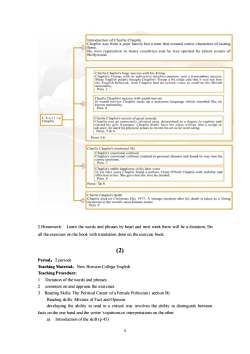
Introduction of Charlie ChaplinChaplin was from a poor family but a man that created comic characters of lastingfame.He won reputation in many countries and he was spotted by talent scouts ofHollywood.Charlie Chaplin's huge success with his TrampChaplin's Tramp,with its subversive mischievousness,won a tremendous success.Many English peoplc thought Chaplin's Tramp a bit crude and that it was not howthe English bchaved.And Chaplin had no screen voice to confirmhis Britishnationality.Para.3CharlieChaplin'ssuccesswithsoundmoviesIn sound movies Chaplin made up a nonsense language which sounded like noknown nationalityPara.4CharlieCharlie Chaplin's sccrets of grcat comedyChaplinChaplinwas an immensclytalentedman,determined to a degreeto exploreandextend his gift.Example:Chaplin didn't have his jokes wrilten into a script inadvance;he uscdhis physical senses to invent his art as he went along.Paras.5&6Paras 3-6Charlie Chaplin's emotional lifeChaplin's cmotional collisionChaplin's emotional collision resulted in personal disaster and found its way into hiscomic creations.Para.7Chaplin's stable happiness in his later yearsIn his later years Chaplinfound a partner,Oona O'Neill Chaplin with stability andaffection in her. She gave him the love he needed.Para.8Paras.7&8Charlie Chaplin's deathChaplin died on Christmas Day 1977.A strange incident after his death is taken as a fittingmemorial totheworld'smostfamous comic.Para.92.Homework:Learn the words and phrases byheart and next week there will be a dictation, Doall the exercises on the book withtranslation done on the exercise book.(2)Period: 2 periodsTeachingMaterial:NewHorizonCollegeEnglishTeaching Procedure:1Dictation of the words and phrases2commentonand appraisetheexercises.3Reading Skills: The Political Career of a Female Politician ( section B)Reading skills: Mixture of Fact and Opiniondeveloping the ability to read in a critical way involves the ability to distinguish betweenfacts on the one hand and the writer'sopinions or interpretations on the other.a)Introductionoftheskill (p45)9
9 2.Homework: Learn the words and phrases by heart and next week there will be a dictation; Do all the exercises on the book with translation done on the exercise book. (2) Period:2 periods Teaching Material:New Horizon College English Teaching Procedure: 1 Dictation of the words and phrases 2 comment on and appraise the exercises. 3 Reading Skills: The Political Career of a Female Politician ( section B) Reading skills: Mixture of Fact and Opinion developing the ability to read in a critical way involves the ability to distinguish between facts on the one hand and the writer’s opinions or interpretations on the other. a) Introduction of the skill (p 45)
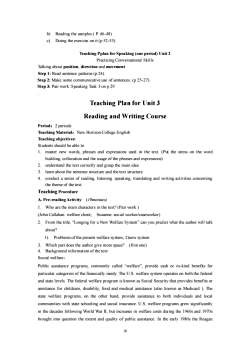
b)Reading the samples (P.46-48)Doing the exercise on it (p 52-53)c)TeachingPplanforSpeaking (oneperiod)Unit2Practicing Conversational SkillsTalking about position, direction and movementStep1:Read sentencepatterns (p24)Step 2: Make some communicative use of sentences. (p 25-27)Step 3: Pair work :Speaking Task 3on p 29TeachingPlanfor Unit3Reading and Writing CoursePeriod:2periodsTeaching Material:New Horizon College EnglishTeaching objectives:Students should beabletomaster new words, phrases and expressions used in the text. (Put the stress on the word1.building, collocation and the usage of the phrases and expressions)2.understand the text correctly and grasp the main idea3.learnaboutthesentencestructureandthetextstructure4.conduct a series of reading, listening ,speaking, translating and writing activities concerningthe theme of the textTeaching ProcedureA.Pre-readingActivity(IOminutes)1.Who are the main characters in thetext?(Pairwork)(JohnCallahan:welfareclient;Suzanne:social worker/caseworker)2.From the title,“Longing for a NewWelfare System"can you predict what the author will talkabout?1).:Problemsofthepresentwelfaresystem,2)newsystem3.Which part does the author give more space?(first one)4.Background information of thetextSocial welfare:Public assistance programs, commonly called welfare", provide cash or in-kind benefits forparticular categories of thefinancially needy.The U.S.welfare system operates on both thefederaland state levels.The federal welfare program is known as Social Security that provides benefits orassistance for childcare, disability, food and medical assistance (also known as Medicaid ) Thestate welfare programs, on the other hand, provide assistance to both individuals and localcommunities with state schooling and social insurance. U.S. welfare programs grew significantlyin the decades following World War Il, but increases in welfare costs during the 1960s and 1970sbrought into question the extent and quality of public assistance. In the early 1980s the Reagan10
10 b) Reading the samples ( P. 46-48) c) Doing the exercise on it (p 52-53) Teaching Pplan for Speaking (one period) Unit 2 Practicing Conversational Skills Talking about position, direction and movement Step 1: Read sentence patterns (p 24). Step 2: Make some communicative use of sentences. (p 25-27). Step 3: Pair work :Speaking Task 3 on p 29 . Teaching Plan for Unit 3 Reading and Writing Course Period:2 periods Teaching Material:New Horizon College English Teaching objectives: Students should be able to 1. master new words, phrases and expressions used in the text. (Put the stress on the word building, collocation and the usage of the phrases and expressions) 2. understand the text correctly and grasp the main idea 3. learn about the sentence structure and the text structure 4. conduct a series of reading, listening ,speaking, translating and writing activities concerning the theme of the text Teaching Procedure A. Pre-reading Activity (10minutes) 1. Who are the main characters in the text? (Pair work ) (John Callahan: welfare client; Suzanne: social worker/caseworker) 2. From the title, “Longing for a New Welfare System” can you predict what the author will talk about? 1). Problems of the present welfare system; 2)new system 3. Which part does the author give more space? (first one) 4. Background information of the text Social welfare: Public assistance programs, commonly called “welfare”, provide cash or in-kind benefits for particular categories of the financially needy. The U.S. welfare system operates on both the federal and state levels. The federal welfare program is known as Social Security that provides benefits or assistance for childcare, disability, food and medical assistance (also known as Medicaid ). The state welfare programs, on the other hand, provide assistance to both individuals and local communities with state schooling and social insurance. U.S. welfare programs grew significantly in the decades following World War II, but increases in welfare costs during the 1960s and 1970s brought into question the extent and quality of public assistance. In the early 1980s the Reagan
按次数下载不扣除下载券;
注册用户24小时内重复下载只扣除一次;
顺序:VIP每日次数-->可用次数-->下载券;
- 《大学英语》课程教学资源(教案讲义)新视野大学英语(3/4).doc
- 《大学英语》课程教学资源(教案讲义)新视野大学英语(2/4).doc
- 《大学英语》课程教学资源(教案讲义)新视野大学英语(1/4).doc
- 《大学英语》课程教学资源(参考资料)大学英语四级考试思考.doc
- 《大学英语》课程教学资源(参考资料)大学英语四级听力应试技巧汇编.doc
- 《大学基础英语》课程PPT教学课件(四)Lesson One Thinking as a Hobby.ppt
- 《大学基础英语》课程PPT教学课件(四)Lesson Two Waiting for the Police.ppt
- 《大学基础英语》课程PPT教学课件(四)Lesson three Why Historians Disagree.ppt
- 《大学基础英语》课程PPT教学课件(四)Lesson Four A Drink in the Passage.ppt
- 《大学基础英语》课程PPT教学课件(四)Lesson Nine The Most Dangerous Game.ppt
- 《大学基础英语》课程PPT教学课件(四)Lesson Five Man of the Moment.ppt
- 《大学基础英语》课程PPT教学课件(四)Lesson Seven Spring Sowing.ppt
- 《大学基础英语》课程PPT教学课件(三)Lesson 04 Wisdom of Bear Wood Michael Welzenbach.ppt
- 《大学基础英语》课程PPT教学课件(三)Lesson 03 Michael Dell’s Two-Billion-Dollar Dream.ppt
- 《大学基础英语》课程PPT教学课件(三)Lesson 02 Discovery of a father.ppt
- 《大学基础英语》课程PPT教学课件(三)Lesson 01 your college years.ppt
- 《大学基础英语》课程PPT教学课件(三)Lesson 06 Twelve Angry Men(Part Two).ppt
- 《大学基础英语》课程PPT教学课件(三)Lesson 05 Twelve Angry Men(Part One).ppt
- 《大学基础英语》课程PPT教学课件(三)Lesson 07 The Rivals Martin Armstrong.ppt
- 《大学基础英语》课程PPT教学课件(三)Lesson 08 We’re Only Human Laura Schlessinger.ppt
- 《大学英语》课程教学资源(参考资料)四级英语考试英译汉必备知识.ppt
- 《大学英语》课程教学资源(参考资料)大学英语四级写作备课指南.doc
- 《大学英语》课程教学资源(参考资料)英汉翻译——翻译理论与实践.ppt
- 《大学英语》课程参考资料(作文写作)keys to writing.doc
- 《大学英语》课程参考资料(作文写作)作文模式.doc
- 《大学英语》课程参考资料(作文写作)参考文章.doc
- 《大学英语》课程参考资料(作文写作)图表.doc
- 《大学英语》课程参考资料(作文写作)大学英语四级选词解题技巧.ppt
- 《大学英语》课程参考资料(作文写作)概述.doc
- 《大学英语》课程参考资料(作文写作)第一讲 基本理论.doc
- 《大学英语》课程参考资料(作文写作)第七讲 利弊.doc
- 《大学英语》课程参考资料(作文写作)第三讲 段首句.doc
- 《大学英语》课程参考资料(作文写作)第九讲 解决问题.doc
- 《大学英语》课程参考资料(作文写作)第二讲 段落构思.doc
- 《大学英语》课程参考资料(作文写作)第五讲 图表作文.doc
- 《大学英语》课程参考资料(作文写作)第八讲 解释原因.doc
- 《大学英语》课程参考资料(作文写作)第六讲 对立观点即疑问句题目.doc
- 《大学英语》课程参考资料(作文写作)第十一讲 书信.doc
- 《大学英语》课程参考资料(作文写作)第十讲 名言.doc
- 《大学英语》课程参考资料(作文写作)第四讲 提纲式.doc
